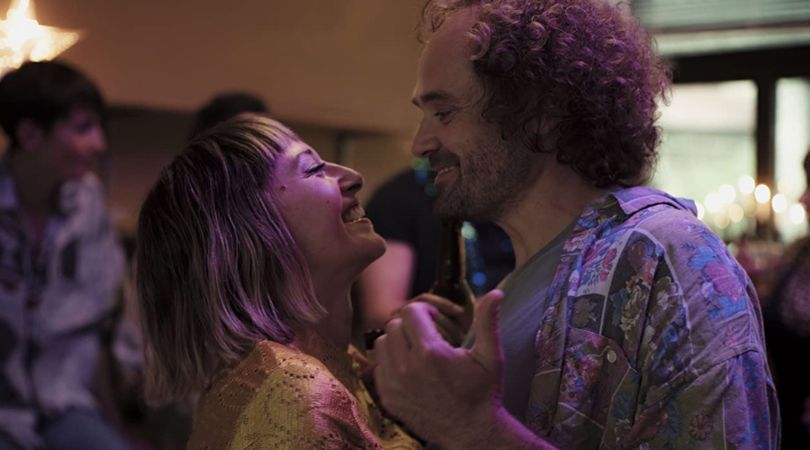
The Tuva Novotny written and directed Swedish-language Netflix romance Diorama is a walk through the stages of coupling, uncoupling, and all of the assumptions we make about monogamy in between. We follow Frieda (Pia Tjelta) and Björn (David Dencik), two parents whose relationship is unraveling. Interspersed by odd but mostly endearing diorama sketches voiced over by sex and relationship experts, the unhappy couple navigates how to change a longstanding relationship into something healthier and more satisfying without destroying their family, or themselves.
To describe Diorama concisely, it’s essentially a romantic drama about non-monogamy and “unconventional” family structures for forty-year-olds who have never sat to think about it before. It doesn’t break any new ground for, say, an audience that is perfectly aware of the ever-growing array of socially acceptable relationship dynamics one can find themself in. But for a whole generation of adults, as the movie aptly begins by explaining in somewhat comedic detail, the idea that you can have multiple partners, or no partner, or different types of intimate and meaningful relationships with different types of people without it being taboo or a pox on your household is completely novel.
When taken as a film with this target audience in mind, the over-simplified history and modernity of sex and relationships doesn’t feel irritating as much as it just feels quaint, in a bless your heart type of way. And the various skits interspersed are in the same vein. Not always that funny, as they have almost a dad-joke humor to them, but certainly not offensive either. They’re meant perhaps for a particular demographic to feel disarmed by more than they are meant to be laugh-out-loud moments. Each one of these dioramas takes some kind of historic or scientific approach to explaining the cycles of coupling and uncoupling our central characters are going through and which roughly half of the married population if not more have experienced. Actors dress up as animals to explain different theories and histories and its all a touch funny.
The characters themselves aren’t to die for, but they’re not to be rooted against either. They do fall into a realm that is impressive to write where you don’t really know which side to take in their affairs. Their arguments are so well scripted and their personalities crafted just well enough that you aren’t meant to take one or the other as the villain. They’re simply two people who have different world views, poor communication, and little will to change. There’s plenty to hate and to admire in them both, which just simply makes them human. While it may have boosted my opinion of the movie as a whole had I had an emotional stake in either of their growth, I wasn’t held back by outright disliking either of them.
Most impressively, I think the movie actually really sticks the landing well. This is by no means an easy line to walk as a topic, especially knowing that it’s designed to be for an audience that isn’t as regularly exposed to this type of story and conclusion as the audience of other similar paths might be. But ultimately, I’m glad for how the movie works to destigmatize “non-traditional” family structures and relationships. It never puts blame or shame on any party, it never makes any type of arrangement out to be more correct or more wrong than another. And while it relies seriously on a bit of hamfisted dialogue, Diorama does fairly well by the kids in the family as well; they’re never quite as used as props in leverage against one another or anything inappropriate like that in the way divorce rom-coms can often do.
Diorama is a bit lackluster as far as its main characters, but its creative approach to storytelling with its odd but somewhat charming diorama skits gives it enough of its own flavor. And most importantly, it offers a positive story about adults learning to embrace relationships and family structures outside of the “normal” ones they’ve been cultured into.
Diorama is streaming now on Netflix.
Diorama
-
Rating - 6.5/106.5/10
TL;DR
Diorama is a bit lackluster as far as its main characters, but its creative approach to storytelling with its odd but somewhat charming diorama skits gives it enough of its own flavor. And most importantly, it offers a positive story about adults learning to embrace relationships and family structures outside of the “normal” ones they’ve been cultured into.






